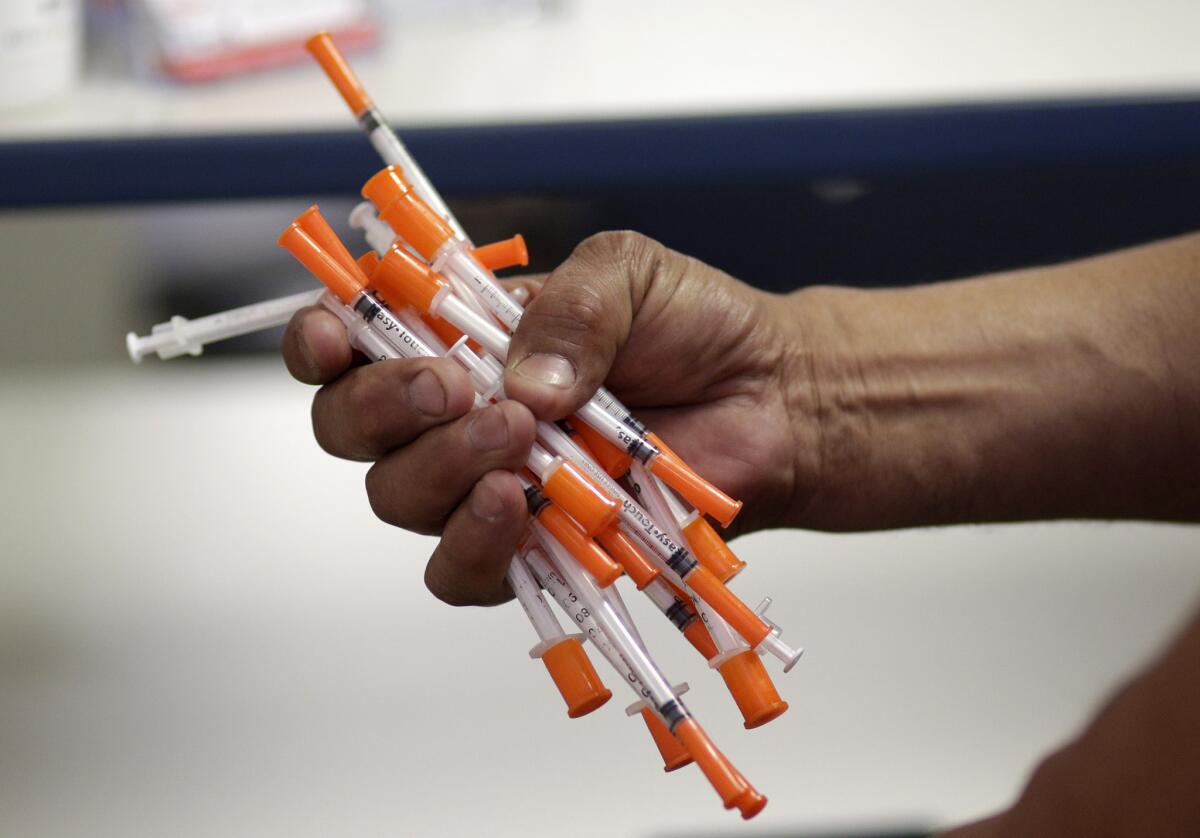Court order all but bans mobile needle exchange program in Costa Mesa, other O.C. cities

In a decision cheered by Orange County leaders Friday, a San Diego County Superior Court judge dealt a significant blow to a state-approved mobile needle-exchange service that sought to operate in Costa Mesa and three other cities.
The ruling signals a potential end to a more than year-long legal battle over the Orange County Needle Exchange Program, which local leaders have long contended would be a nuisance and potentially create a public health and safety hazard.
“The state failed to do its due diligence and comply with its own environmental laws when it approved the Orange County Needle Exchange Program,” county Supervisor Michelle Steel said in a prepared statement Friday. “State officials ignored the pleas of local leaders and decided to prioritize easy access to needles for drug addicts over the health and safety of our communities.”
In their lawsuit against the program, Orange County, the county Flood Control District and the cities of Costa Mesa, Anaheim and Orange argued that the California Department of Public Health’s approval of the needle exchange violated the California Environmental Quality Act, since “the OCNEP has resulted in syringe litter, which creates environmental impacts to public health and safety that have not been addressed through CEQA environmental review.”
Judge Joel Wohlfeil agreed, finding that “the activity approved through the CDPH authorization is a ‘project’ subject to CEQA review.”
“The application for operation of a mobile [syringe exchange program] constitutes an activity capable of causing a direct physical change in the environment,” he wrote in his ruling, dated Friday. “There is a possibility that the project will result in an increase in used needle litter, a biohazard.”
Needle-exchange program activity also “is capable of causing environmental impacts on the basis that the mobile service will attract and cause car trips,” he added.
Representatives from the Orange County Needle Exchange Program could not immediately be reached for comment. However, advocates of giving intravenous drug users clean syringes say that doing so can reduce the rate of HIV, hepatitis C and other infections spread through shared needles.
As approved by the state, the program would have been able to distribute needles and other supplies in Costa Mesa on West 17th Street between Whittier Avenue and the city boundary during specified times.
The program began operating at the Santa Ana Civic Center in 2016, but closed in 2018 when the city denied its permit, citing public health concerns. Santa Ana leaders complained of an increase in the number of discarded syringes in the Civic Center area.
The program then petitioned the Department of Public Health for a mobile exchange program that would have operated in Costa Mesa, Santa Ana, Anaheim and Orange.
The Board of Supervisors passed a resolution opposing the concept because of potential health and safety risks, but the state approved the program regardless in July 2018.
The county sued to block the program that August. Costa Mesa, Anaheim, Orange and, eventually, Newport Beach all signed on to support the litigation.
“This is an incredible victory for the county of Orange and the citizens of Orange County,” Supervisor Lisa Bartlett said in a statement. “The state of California will now need to comply with its own laws and we can better ensure that the safety and health of our residents can be preserved.”
Last August, the Costa Mesa City Council unanimously approved a permanent ban on clean-needle exchanges. The vote codified earlier, temporary bans that the council enacted after the state’s decision.
“Evidence of more than 200,000 needles in the public space creates an environmental hazard not analyzed by the state,” Costa Mesa Mayor Katrina Foley said Friday. “It’s unfortunate that local entities had to expend taxpayer funds litigating to force compliance with laws intended to protect the public.”
All the latest on Orange County from Orange County.
Get our free TimesOC newsletter.
You may occasionally receive promotional content from the Daily Pilot.





